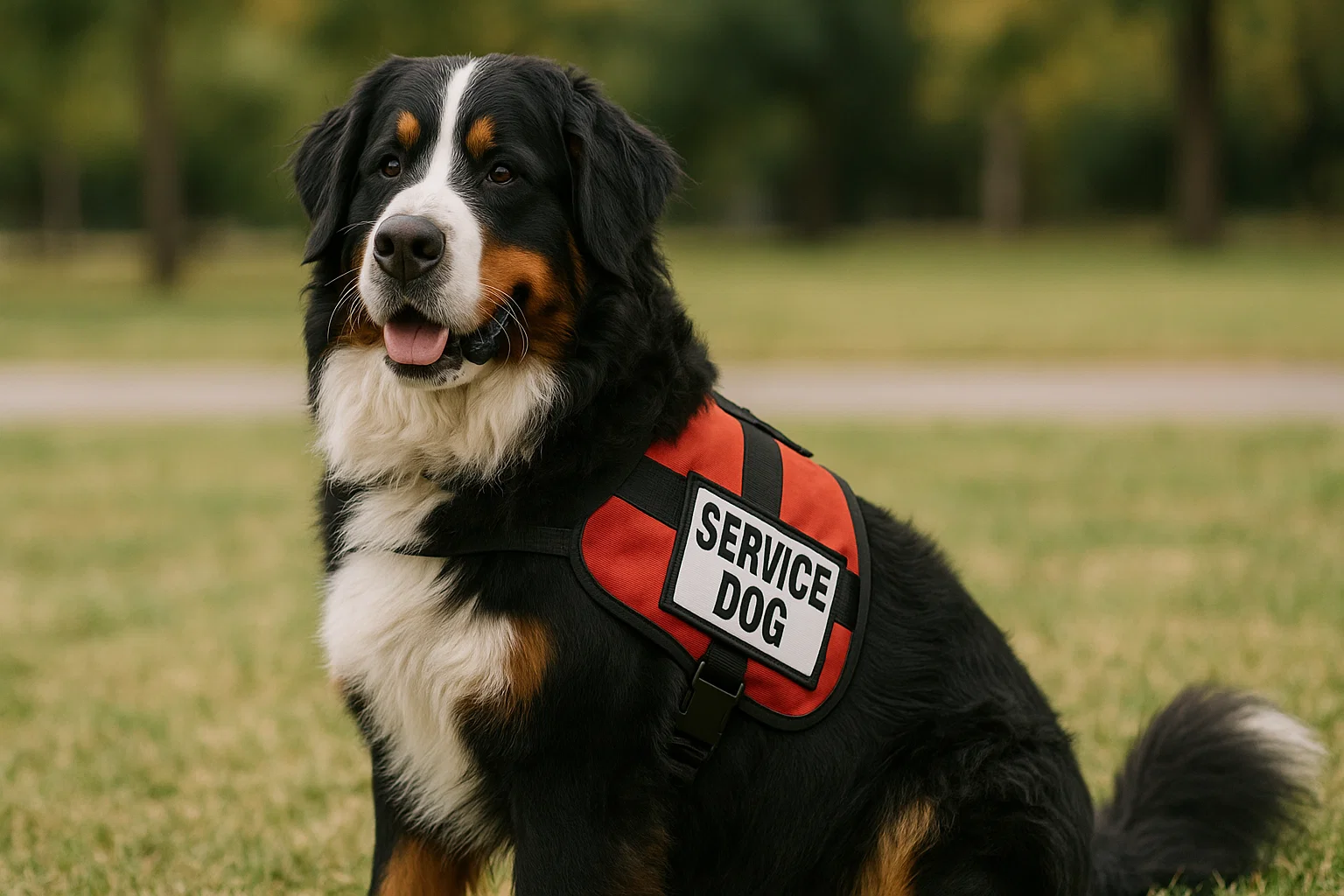Bernese Mountain Dog as a Service Dog

The use of dogs in service roles has grown exponentially, with many breeds finding their special niche in aiding humans with various disabilities. Among these breeds, the Bernese Mountain Dog stands out for its combination of strength, temperament, and overall adaptability. While it might not be as commonly seen in service dog vests as a Labrador or Golden Retriever, the Bernese Mountain Dog has specific attributes that make it highly suitable for certain types of service work.
Bernese Mountain Dog Overview
The Bernese Mountain Dog, a large, stately breed originating from the Swiss Alps, is renowned for its gentle disposition and impressive strength. Initially used as farm dogs, helping with everything from herding cattle to pulling carts, the Bernese has a storied history in assisting humans. This inherent inclination towards service makes the breed an interesting candidate for modern service work.
Physical Characteristics
The Bernese Mountain Dog is physically imposing, with an average height of 23 to 28 inches at the shoulder and weight ranging from 70 to 115 pounds or more. Their size and strength are both a boon and a challenge in the realm of service work.
- Advantages:
- Strength: Their build allows them to perform tasks that require physical assistance, such as pulling a wheelchair or supporting a person with mobility challenges.
- Endurance: While they have a calm demeanor, their working dog heritage gives them stamina suitable for long sessions of service work.
- Considerations:
- Size: Their substantial size may be a disadvantage in tight public spaces or crowded urban environments.
- Climate Sensitivity: With their thick, double coat, Bernese Mountain Dogs are more comfortable in cooler climates, making hot environments potentially problematic.
Temperament and Attitude
The temperament of the Bernese Mountain Dog is one of its most endearing qualities. Known for being affectionate, loyal, and calm, they often exemplify what people picture when thinking of a family-friendly dog.
- Advantages:
- Calmness: Their composed nature allows Bernese to remain unfazed in varied and sometimes chaotic situations, making them reliable in public places and during stressful incidents.
- Friendliness: They typically have an affable disposition towards strangers, which is crucial for a service dog that must work in public settings.
- Considerations:
- Separation Anxiety: Bernese are prone to forming strong bonds with their human companions, which can lead to separation anxiety if not properly managed.
- Fearfulness: Though generally calm, some can be sensitive to loud noises or sudden movements, which may require additional socialization and training.
Types of Service Work
Bernese Mountain Dogs are versatile and can be trained for various types of service work. However, their specific attributes make them particularly well-suited to specific roles.
- Mobility Assistance: Due to their size and strength, Bernese are excellent candidates for mobility assistance tasks. They can help individuals who need physical support with balance or perform weight-bearing tasks.
- Therapy Work: Their gentle and calming demeanor makes them ideal for therapy work, providing emotional support in settings like hospitals or nursing homes.
- Medical Alert: While less common, some Bernese have been trained for medical alert roles, detecting conditions such as seizures or low blood sugar.
- Emotional Support: Their loving nature suits them well for providing emotional support, helping alleviate anxiety and promoting a sense of well-being in their human companions.
Health Considerations
While the Bernese Mountain Dog's attributes make it a strong candidate for many types of service work, some health issues inherent to the breed must be considered.
- Joint Issues: The breed is prone to hip and elbow dysplasia, which can limit their capacity for certain physical tasks and reduce their working life.
- Cancer: Bernese Mountain Dogs have a relatively high incidence of certain cancers, which can affect their overall lifespan and capabilities.
- Bloat: Like many large breeds, Bernese can experience bloat, a serious condition that can be life-threatening if not addressed promptly.
These health concerns necessitate regular monitoring and may limit the duration of their active service. It's crucial for handlers to keep a close eye on any developing health issues.
Training and Suitability
Bernese Mountain Dogs are generally eager to please and responsive to training, but their training needs and capabilities can influence their suitability as service dogs.
- Intelligence: They are intelligent and quick learners, which benefits their training process. Positive reinforcement techniques work particularly well.
- Consistency and Patience: Despite their willingness to learn, Bernese can sometimes be stubborn. Trainers need to employ consistent training techniques and exhibit patience.
- Socialization: Early and consistent socialization is important to ensure they are comfortable and confident in a variety of environments and situations.
With the right training approach, Bernese Mountain Dogs can be exceptional service animals, albeit potentially taking slightly longer to train than some of their more commonly deployed counterparts.
Summary of Bernese Mountain Dog
The Bernese Mountain Dog is a breed with both physical and psychological traits that can make it a useful service dog with the right training and environment. However, potential handlers should carefully consider the breed's health predispositions and ensure appropriate measures are in place to manage any potential issues.
Key Strengths:
- Great strength and size for mobility tasks
- Calm, friendly temperament suitable for public work
- Loyal and eager to please
Key Weaknesses:
- Potential health issues (joint problems, cancer, bloat)
- Size can be a limitation in certain environments
- Can exhibit separation anxiety if not well-managed
Ideal Service Roles:
- Mobility assistance
- Therapy work
- Emotional support
In conclusion, while the Bernese Mountain Dog might not be the first breed that comes to mind as a service dog, its combination of strength, temperament, and trainability make it a worthy candidate for specific service roles, particularly when considering mobility assistance and therapy work. With careful training and health monitoring, a Bernese can bring great joy and support to those in need.











